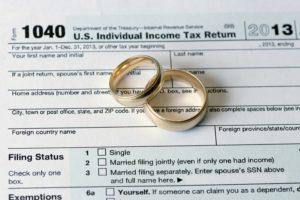 When filing Form N-400 (Application for Naturalization) on the basis of 3 years of permanent residence while married to a U.S. citizen, it’s necessary to submit evidence of living in marital union. In other words, USCIS wants proof that the applicant was in a genuine marriage for the entire period. USCIS considers an applicant to “live in marital union” with his or her citizen spouse if the applicant and the citizen actually reside together. (There are limited circumstances where an applicant may be able to establish that he or she is living in marital union with his or her citizen spouse even though the applicant does not actually reside with the citizen spouse.)
When filing Form N-400 (Application for Naturalization) on the basis of 3 years of permanent residence while married to a U.S. citizen, it’s necessary to submit evidence of living in marital union. In other words, USCIS wants proof that the applicant was in a genuine marriage for the entire period. USCIS considers an applicant to “live in marital union” with his or her citizen spouse if the applicant and the citizen actually reside together. (There are limited circumstances where an applicant may be able to establish that he or she is living in marital union with his or her citizen spouse even though the applicant does not actually reside with the citizen spouse.)
One of the primary documents to demonstrate living in a bona fide marriage is to submit copies of joint income tax returns (or an IRS tax transcript) for each of the relevant years. A tax return that shows you were married and filed jointly with your spouse is an indicator that there was a genuine marriage.
RECOMMENDED: Citizenship Requirements for 3-Year LPR Married to a U.S. Citizen
Married Filing Separate
But what if you filed separately? Some couples may have filed “married filing separate.” Although this is not ideal, it isn’t necessarily a problem. It does not prevent you from successfully filing N-400 to become a U.S. citizen.
The choice to file married but separate could have been made because of a tax advantage. Its plausible to file this way if it offered a financial advantage. Obviously, both tax returns should have the same address. Further, you’ll need to provide alternative evidence to demonstrate that you live in marital union. This may include but is not limited to:
- Copies of statements from joint accounts with both spouses’ names. Joint accounts may include checking, savings, credit card, insurance policies, leases or mortgages; or
- Copies of birth certificates for any children born into the marriage (if possible); or
- Any other evidence of family ties that demonstrate your bona fide marriage. You may provide photos of both spouses (e.g. vacations, visiting extended family, etc.).
On the other hand, if you are married and filed single in an attempt to avoid income taxes, this sets up other problems. If you have failed to file a tax return as required, filed fraudulently or have unpaid income taxes, it’s best to speak with an immigration attorney before filing Form N-400.
RECOMMENDED: 5 Common Reasons Form N-400 Gets Denied

